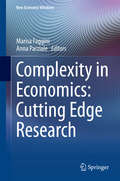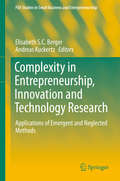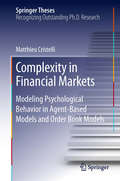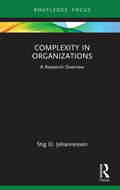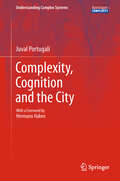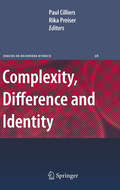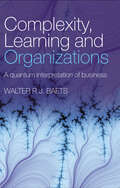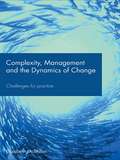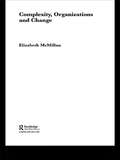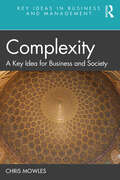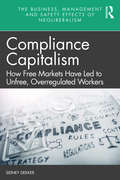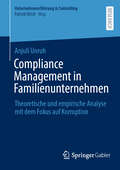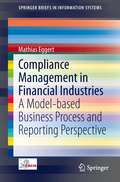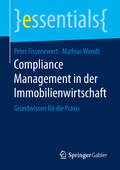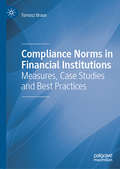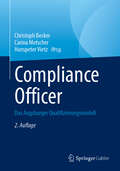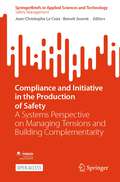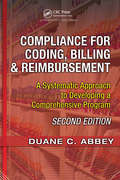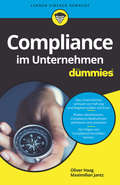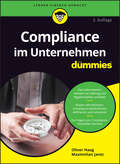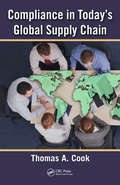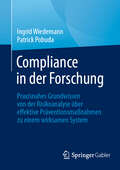- Table View
- List View
Complexity in Economics (Elements in Complexity and Agent-based Economics)
by Giacomo Gallegati Mauro Gallegati Simone LandiniNeoclassical economics is heavily based on a formalistic method, primarily centred on mathematical deduction. Consequently, mainstream economists became overfocused on describing the states of an economy rather than understanding the processes driving these states. However, many phenomena arise from the intricate interactions among diverse elements, eluding explanation solely through micro-level rules. Such systems, characterised by emergent properties arising from interactions, are defined as complex. This Element delves into the complexity approach, portraying the economy as an evolving system undergoing structural changes over time.
Complexity in Economics: Cutting Edge Research (New Economic Windows)
by Marisa Faggini Anna ParzialeIn this book, leading experts discuss innovative components of complexity theory and chaos theory in economics. The underlying perspective is that investigations of economic phenomena should view these phenomena not as deterministic, predictable and mechanistic but rather as process dependent, organic and always evolving. The aim is to highlight the exciting potential of this approach in economics and its ability to overcome the limitations of past research and offer important new insights. The book offers a stimulating mix of theory, examples and policy. By casting light on a variety of topics in the field, it will provide an ideal platform for researchers wishing to deepen their understanding and identify areas for further investigation.
Complexity in Entrepreneurship, Innovation and Technology Research: Applications of Emergent and Neglected Methods (FGF Studies in Small Business and Entrepreneurship)
by Andreas Kuckertz Elisabeth S.C. BergerThisvolume discusses the challenge of dealing with complexity in entrepreneurship,innovation and technology research. Businesses as well as entire economies areincreasingly being confronted by widespread complex systems. Fields such asentrepreneurship and innovation cannot ignore this reality, especially withtheir inherent links to diverse research fields and interdisciplinary methods. However, most methods that allow more detailed analyses of complex problems areeither neglected in mainstream research or are, at best, still emerging. Against this backdrop, this book provides a forum for the discussion ofemergent and neglected methods in the context of complexity inentrepreneurship, innovation and technology research, and also acts as aninspiration for academics across related disciplines to engage more incomplexity research.
Complexity in Financial Markets: Modeling Psychological Behavior in Agent-Based Models and Order Book Models (Springer Theses)
by Matthieu CristelliTools and methods from complex systems science can have a considerable impact on the way in which the quantitative assessment of economic and financial issues is approached, as discussed in this thesis. First it is shown that the self-organization of financial markets is a crucial factor in the understanding of their dynamics. In fact, using an agent-based approach, it is argued that financial markets' stylized facts appear only in the self-organized state. Secondly, the thesis points out the potential of so-called big data science for financial market modeling, investigating how web-driven data can yield a picture of market activities: it has been found that web query volumes anticipate trade volumes. As a third achievement, the metrics developed here for country competitiveness and product complexity is groundbreaking in comparison to mainstream theories of economic growth and technological development. A key element in assessing the intangible variables determining the success of countries in the present globalized economy is represented by the diversification of the productive basket of countries. The comparison between the level of complexity of a country's productive system and economic indicators such as the GDP per capita discloses its hidden growth potential.
Complexity in Organizations: A Research Overview (State of the Art in Business Research)
by Stig O. JohannessenWritten with pace and clarity, this book is a comprehensive and compact overview and introduction to the research landscape of complexity in organizations. In addition to conveying a gripping history of how complexity has influenced organizational ideas, theories, and practices throughout the 20th century and into our present age, the book sheds light on how ground-breaking ideas in chaos and complexity research have emerged and challenged the very foundations of science into a changed vision of nature, society, and human organizations. As well as being an exciting investigation into complexity research in organizations, the book shows how, in the past, researchers who were immersed in the power politics of their day grappled with the theme of complexity in their quest to understand the dynamics of organization in nature and society. By welding fundamental theoretical themes and practical implications into the political and social contexts in which they emerged, this overview provides both depth and breadth to the history, as well as the future, of studies of complexity in organized activity. The book is a lucid and essential study of a topic that will be of interest to scholars, researchers, and students in the fields of business and management, especially those with an interest in the ways that complexity affects and transforms organizations.
Complexity, Cognition and the City: Simulation, Cognition And Vr In The Study And Planning Of Cities (Understanding Complex Systems)
by Juval PortugaliComplexity, Cognition and the City aims at a deeper understanding of urbanism, while invoking, on an equal footing, the contributions both the hard and soft sciences have made, and are still making, when grappling with the many issues and facets of regional planning and dynamics. In this work, the author goes beyond merely seeing the city as a self-organized, emerging pattern of some collective interaction between many stylized urban "agents" - he makes the crucial step of attributing cognition to his agents and thus raises, for the first time, the question on how to deal with a complex system composed of many interacting complex agents in clearly defined settings. Accordingly, the author eventually addresses issues of practical relevance for urban planners and decision makers. The book unfolds its message in a largely nontechnical manner, so as to provide a broad interdisciplinary readership with insights, ideas, and other stimuli to encourage further research - with the twofold aim of further pushing back the boundaries of complexity science and emphasizing the all-important interrelation of hard and soft sciences in recognizing the cognitive sciences as another necessary ingredient for meaningful urban studies.
Complexity, Difference and Identity: An Ethical Perspective (Issues in Business Ethics #26)
by Rika Preiser Paul Cilliers"Complexity" has been part of the academic discourse for a decade or two. Texts on Complexity fall mainly in two categories: fairly technical and mathematical on the one hand, and fairly broad, vague and general on the other. Paul Cilliers' book Complexity and Postmodernism. Understanding Complex Systems (Routledge 1998) constituted an attempt to bridge this divide by reflecting more rigorously on the philosophical implications of complexity, and by making it accessible to the social sciences. This edited volume is a continuation of this project, with specific reference to the ethical implications of acknowledging complexity. These issues are pertinent to our understanding of organisations and institutions and could contribute significantly to the development of a richer understanding of ethics in business and would be a useful tool for teachers, researchers and post-graduate students with ethical concerns in disciplines ranging from Philosophy, Applied Ethics, Sociology, Organisational Studies, Political Science, Anthropology and Cultural Studies. The central theme which binds all the contributions together is: the inevitability of normative and ethical issues when dealing with complex phenomena. The book should thus be useful in the development of Business Ethics on two levels: in the first place on the level of developing a strong theoretical foundation, in the second place in providing specific examples of this theory in action in the real world.
Complexity, Heterogeneity, and the Methods of Statistical Physics in Economics: Essays in Memory of Masanao Aoki (Evolutionary Economics and Social Complexity Science #22)
by Hideaki Aoyama Yuji Aruka Hiroshi YoshikawaThis book systematically provides a prospective integrated approach for complexity social science in its view of statistical physics and mathematics, with an impressive collection of the knowledge and expertise of leading researchers from all over the world. The book mainly covers both finitary methods of statistical equilibrium and data-driven analysis by econophysics. The late Professor Masanao Aoki of UCLA, who passed away at the end of July 2018, in his later years dedicated himself to the reconstruction of macroeconomics mainly in terms of statistical physics. Professor Aoki, who was already an IEEE fellow, was also named an Econometric Society Fellow in 1979. Until the early 1990s, however, his contributions were focused on the new developments of a novel algorithm for the time series model and their applications to economic data. Those contributions were undoubtedly equivalent to the Nobel Prize-winning work of Granger's "co-integration method". After the publications of his New Approaches to Macroeconomic Modeling and Modeling Aggregate Behavior and Fluctuations in Economics, both published by Cambridge University Press, in 1996 and 2002, respectively, his contributions rapidly became known and spread throughout the field. In short, these new works challenged econophysicists to develop evolutionary stochastic dynamics, multiple equilibria, and externalities as field effects and revolutionized the stochastic views of interacting agents. In particular, the publication of Reconstructing Macroeconomics, also by Cambridge University Press (2007), in cooperation with Hiroshi Yoshikawa, further sharpened the process of embodying “a perspective from statistical physics and combinatorial stochastic processes” in economic modeling. Interestingly, almost concurrently with Prof. Aoki’s newest development, similar approaches were appearing. Thus, those who were working in the same context around the world at that time came together, exchanging their results during the past decade. In memory of Prof. Aoki, this book has been planned by authors who followed him to present the most advanced outcomes of his heritage.
Complexity, Learning and Organizations: A Quantum Interpretation of Business
by Walter R.J. BaetsThis fascinating book argues for a new way of looking at the world and at human systems, companies or (Western) society as a whole. Walter R.J. Baets argues that we should let go of our drive to control, manage and organize, in order to be able to create an ideal environment for continuous learning, both for ourselves and for our collaborators. Arguing in favour of a holistic management approach, and very much in opposition to the short-term shareholder value driven approaches that are popular today, Baets’ book develops a logic founded in real life observations, examples and cases that every reader will recognize in their daily practice. It guides the reader to understand an alternative paradigm and allows them finally to be able to work with the dynamics of business on a daily basis. A must-read for students of complexity, strategy and organizational behaviour, this well-researched, well-argued book skilfully guides the reader through this interesting subject.
Complexity, Management and the Dynamics of Change: Challenges for Practice
by Elizabeth McMillanThe insights of complexity science can allow today’s managers to embrace the challenges and uncertainty of the twenty-first century, and successfully oversee organizational change and development. Elizabeth McMillan's book brings these ideas into perspective by: outlining the historical relationship between science and organizations reviewing current perspectives on organizational change and best practice citing real-life examples of the use of complexity science ideas discussing issues which may arise when using ideas from complexity. Written in an accessible style to bridge the gap from scientific theory to commercial applicability, this text shows how organizations can become more effective, democratic and sustainable through complexity science.
Complexity, Organizations and Change: An Essential Introduction (Routledge Studies In Complexity And Management Ser. #Vol. 1)
by Elizabeth McMillanComplexity science has seriously challenged long-held views in the scientific community about how the world works. These ideas, particularly about the living world, also have radical and profound implications for organizations and society as a whole. Available in paperback for the first time, this insightful book describes and considers ideas from
Complexity: A Key Idea for Business and Society (Key Ideas in Business and Management)
by Chris MowlesThis book interprets insights from the complexity sciences to explore seven types of complexity better to understand the predictable unpredictability of social life. Drawing on the natural and social sciences, it describes how complexity models are helpful but insufficient for our understanding of complex reality. Taking an interdisciplinary approach, the book develops a complex theory of action more consistent with our experience that our plans inevitably lead to unexpected outcomes, explains why we are both individuals and thoroughly social, and gives an account of why, no matter how clear our message, we may still be misunderstood. The book investigates what forms of knowledge are most helpful for thinking about complex experience, reflects on the way we exercise authority (leadership) and thinks through the ethical implications of trying to co-operate in a complex world. Taking complexity seriously poses a radical challenge to more orthodox theories of managing and leading, based as they are on assumptions of predictability, control and universality. The author argues that management is an improvisational practice which takes place in groups in a particular context at a particular time. Managers can influence but never control an uncontrollable world. To become more skilful in complex group dynamics involves taking into account multiple points of view and acknowledging not knowing, ambivalence and doubt. This book will be of interest to researchers, professionals, academics and students in the fields of business and management, especially those interested in how taking complexity seriously can influence the functioning of businesses and organizations and how they manage and lead.
Complexity: One Dimension of Adaptive Project Management
by Aaron J. Shenhar Dov DvirHow complex is your product or your organization? Higher complexity requires bigger organizations, more interaction, and increased formality. This chapter addresses the best way to define and distinguish between levels of project complexity.
Compliance Capitalism: How Free Markets Have Led to Unfree, Overregulated Workers (The Business, Management and Safety Effects of Neoliberalism)
by Sidney DekkerIn this book, Sidney Dekker sets out to identify the market mechanisms that explain how less government paradoxically leads to greater compliance burdens. This book gives shape and substance to a suspicion that has become widespread among workers in almost every industry: we have to follow more rules than ever—and still, things can go spectacularly wrong. Much has been privatized and deregulated, giving us what is sometimes known as ‘new public management,’ driven by neoliberal, market-favoring policies. But, paradoxically, we typically have more rules today, not fewer. It’s not the government: it’s us. This book is the first of a three-part series on the effects of ‘neoliberalism,’ which promotes the role of the private sector in the economy. Compliance Capitalism examines what aspects of the compliance economy, what mechanisms of bureaucratization, are directly linked to us having given free markets a greater reign over our political economy. The book steps through them, picking up the evidence and levers for change along the way. Dekker’s work has always challenged readers to embrace more humane, empowering ways to think about work and its quality and safety. In Compliance Capitalism, Dekker extends his reach once again, writing for all managers, board members, organization leaders, consultants, practitioners, researchers, lecturers, students, and investigators curious to understand the genuine nature of organizational and safety performance.
Compliance Management in Familienunternehmen: Theoretische und empirische Analyse mit dem Fokus auf Korruption (Unternehmensführung & Controlling)
by Anjuli UnruhAnjuli Unruh beleuchtet in diesem Buch die zunehmende Bedeutung von Compliance-Management als Bestandteil einer nachhaltigen Corporate Governance, insbesondere in mittelständischen Familienunternehmen. Sie reagiert auf die wachsende Relevanz von Wirtschaftskriminalität und die damit verbundenen Herausforderungen, die durch regulatorische Anforderungen und öffentliche Erwartungen verschärft werden. Im Mittelpunkt steht das Spannungsfeld zwischen gesetzlichen Vorgaben, individuellen Governance-Strukturen und den soziokulturellen Besonderheiten von Familienunternehmen. Ziel ist die Entwicklung eines konzeptionellen Ansatzes, der die Führungs- und Kontrollstrukturen in mittelständischen Familienunternehmen systematisch abbildet und dabei die Wechselwirkungen zwischen Compliance-Management, Wertschöpfung und Korruption berücksichtigt. Die Analyse liefert praxisnahe Erkenntnisse und evidenzbasierte Handlungsempfehlungen zur Verbesserung des Compliance- und Anti-Korruptionsmanagements. Sie trägt zur Erweiterung der Wissensbasis im Bereich der Unternehmensführung bei und zeigt auf, wie Compliance-Management als Erfolgsfaktor für eine werteorientierte und nachhaltige Unternehmensführung in mittelständischen Familienunternehmen implementiert werden kann.
Compliance Management in Financial Industries: A Model-based Business Process and Reporting Perspective (SpringerBriefs in Information Systems)
by Mathias EggertSince the peak of the world financial crisis in 2008, compliance management has gained more and more interest from practice and research. In particular the financial service industry is strongly regulated and has to follow specific laws, standards and guidelines. Considering the steadily increasing number of legal requirements in the design of information systems is a challenge to financial service providers. This book investigates the challenges of compliance management in financial industries and provides solutions for a compliant design of information models. From a business process perspective, an approach is presented that enables the automatic checking of business process models. From a supervisory reporting perspective a modeling technique is presented that allows for modeling regulatory data warehouse requirements as well as its analysis. Besides these two perspectives the author provides insights into the perceived relationship of Information Systems and Law.
Compliance Management in der Immobilienwirtschaft: Grundwissen für die Praxis (essentials)
by Mathias Wendt Peter FissenewertDie Autoren leisten mit diesem essential einen Beitrag zur Entwicklung einer starken Compliance-Kultur in immobilienwirtschaftlichen Unternehmen. Sie stellen die bestehenden Compliance-Anforderungen, die maßgeblichen Haftungs- und Reputationsrisiken, die in der Praxis besonders relevanten Compliance-Themenfelder sowie zentrale Handlungsfelder bei der Umsetzung eines wirksamen Compliance Management Systems in kompakter Form dar. Konkrete Praxishinweise unterstützen die sachgerechte Umsetzung und Weiterentwicklung des Compliance Managements. Damit liefern sie eine hilfreiche Orientierung, um sich auf effektive Weise über die relevanten Aspekte des Compliance Managements zu informieren.
Compliance Norms in Financial Institutions: Measures, Case Studies and Best Practices
by Tomasz BraunInitially, introducing compliance functions within the financial industry had been forced by regulatory scrutiny. Later, it started to spread to other regulated companies, in particular those publicly listed. Now, compliance has become an asset of corporates that want to build their reliability among clients, shareholders, employees and business partners. This book looks at the efficiency of the compliance measures introduced and the best practices of building compliance norms.This recently observed practice of compliance was triggered by the expectation of regulators, shareholders, clients, business partners and the public for robust compliance mechanisms. This book looks at the vast interest in this topic among business people who strive to introduce the systems and the mechanisms of non-compliance risk management in their companies and at the uncountable difficulties and obstacles they meet. The book fills the gap of thorough analysis of this subject by pointing out the solutions successfully introduced in global financial organizations, and would be of interest to academics, researchers and practitioners in corporate finance, corporate governance and risk management.
Compliance Officer: Das Augsburger Qualifizierungsmodell
by Christoph Becker Carina Metscher Hanspeter VietzAufbau, Implementierung und Gelebtwerden einer Compliance-Organisation in Unternehmen erfordern eine ganzheitliche Sichtweise auf das Thema. Ausgehend von juristischen und betriebswirtschaftlichen Fragestellungen beleuchten die Beiträge dieses Bandes die wichtigsten Compliance-Risiken in Unternehmen. Die Autoren diskutieren die Implementierung im Rahmen der Unternehmensorganisation und legen besonderes Augenmerk auf die IT-Strukturen. Die persönlichen Anforderungen an den Compliance-Beauftragten sowie die ethische Verantwortung im Bereich der Compliance bilden einen weiteren Schwerpunkt. Die konsequent praxisorientierte Behandlung des Themas Compliance wird im Kapitel "Praxisfragen der Compliance" mit Themen wie Compliance und M&A, Collective Action, Compliance im Konzern explizit betont.
Compliance and Initiative in the Production of Safety: A Systems Perspective on Managing Tensions and Building Complementarity (SpringerBriefs in Applied Sciences and Technology)
by Benoît Journé Jean-Christophe Le CozeThis open access book addresses the idea that there are two ways to go about achieving a safe working environment. The text challenges the prevailing notion that compliance with a rule system, imposed from the top of an organization and designed to anticipate possible hazards in system operation, is really incompatible with the idea that the professional expertise of front-line workers is what promotes safe outcomes despite inevitable unanticipated perturbations. The contributors, drawn from academic and industrial backgrounds, demonstrate that rather than being at odds with each other, rules-compliance and proactivity are in fact complementary resources the coexistence of which increases safety. Furthermore, the implications of this approach extend beyond safety, being relevant to business performance, strategies for innovation and system resilience as well.The book steps back from an exclusive focus on front-line work to explore the way in which compliance and initiative are articulated at different levels within the hierarchy of a firm, right up to that of top management. Further, the contributors analyze the way in which safety authorities, the justice system, and the general public perceive and interpret such strategies, in particular in the aftermath of major events.This book deals with issues of interest to researchers and graduate students in safety science and organization studies and to members of expert bodies and experts in industry and consultancy concerned with similar subjects.
Compliance for Coding, Billing & Reimbursement: A Systematic Approach to Developing a Comprehensive Program
by James H. Handwerk Mark J. Kaiser Duane C. AbbeyWhile the vast majority of providers never intend to commit fraud or file false claims, complex procedures, changing regulations, and evolving technology make it nearly impossible to avoid billing errors. For example, if you play by HIPAA’s rules, a physician is a provider; however, Medicare requires that the same physician must be referred to as a supplier. Even more troubling is the need to alter claims to meet specific requirements that may conflict with national standards. Far from being a benign issue, differing guidelines can lead to false claims with financial and even criminal implications. Compliance for Coding, Billing & Reimbursement, Second Edition: A Systematic Approach to Developing a Comprehensive Program provides an organized way to deal with the complex coding, billing, and reimbursement (CBR) processes that seem to force providers to choose between being paid and being compliant. Fully revised to account for recent changes and evolving terminology, this unique and accessible resource covers statutorily based programs and contract-based relationships, as well as ways to efficiently handle those situations that do not involve formal relationships. Based on 25 years of direct client consultation and drawing on teaching techniques developed in highly successful workshops, Duane Abbey offers a logical approach to CBR compliance. Designed to facilitate efficient reimbursements that don’t run afoul of laws and regulations, this resource – Addresses the seven key elements promulgated by the OIG for any compliance program Discusses numerous types of compliance issues for all type of healthcare providers Offers access to online resources that provide continually updated information Cuts through the morass of terminology and acronyms with a comprehensive glossary Includes downloadable resources packed with regulations and information In addition to offering salient information illustrated by case studies, Dr, Abbey provides healthcare providers and administrators, as well as consultants and attorneys, with the mindset and attitude required to meet this very real challenge with savvy, humor, and perseverance.
Compliance im Unternehmen für Dummies (Für Dummies)
by Oliver Haag Maximilian JantzErfüllt Ihr Unternehmen die gesetzlichen Vorgaben? Die Rechtsfolgen bei Compliance-Verstößen können erheblich sein. Wer sich also mit Compliance auskennt, die Risiken kennt und zu vermeiden oder zumindest zu begrenzen weiß, der ist gut beraten. Dieses Buch zeigt, mit welchen konkreten Compliance-Maßnahmen Sie Ihr Unternehmen sauber halten und sich wirkungsvoll gegen Compliance-Verstöße wie zum Beispiel Korruption oder andere Regelverstößeschützen können.
Compliance im Unternehmen für Dummies (Für Dummies)
by Oliver Haag Maximilian JantzErfüllt Ihr Unternehmen die gesetzlichen Vorgaben? Die Rechtsfolgen bei Compliance-Verstößen können erheblich sein. Wer sich also mit Compliance auskennt, die Risiken kennt und zu vermeiden oder zumindest zu begrenzen weiß, der ist gut beraten. Dieses Buch zeigt, mit welchen konkreten Compliance-Maßnahmen Sie Ihr Unternehmen sauber halten und sich wirkungsvoll gegen Compliance-Verstöße wie zum Beispiel Korruption oder andere Regelverstößeschützen können.
Compliance in Today's Global Supply Chain
by Thomas A. CookAn expert on global supply chain management, Tom Cook is the recipient of numerous accolades, including an International Partnership Award bestowed by President Bill Clinton. In this book, Cook provides a blueprint for executing a compliant and cost-effective global trade program. Covering best practices for outbound and inbound logistics, the book identifies traditional and emerging complications, details solutions for building and securing the global supply chain, and includes compliance information organized by government agency. It also provides proven approaches for billing and record keeping, and discusses prevalent homeland security issues.
Compliance in der Forschung: Praxisnahes Grundwissen von der Risikoanalyse über effektive Präventionsmaßnahmen zu einem wirksamen System
by Patrick Pobuda Ingrid WiedemannDieses Buch gibt einen Überblick, wie für Wissenschaftler:innen und Firmen bzw. Organisationen im Forschungsbereich der Einsatz von Compliance-Programmen wirksam gelingen kann. Es gilt dabei den potenziellen Konflikt zwischen der Wissenschaftsfreiheit und der Einhaltung von regulatorischen Vorgaben sowie kommerziellen Interessen aufzuheben, damit sich der hiesige Forschungsstandort auch trotz steigender Compliance-Risiken erfolgreich weiterentwickeln kann. Im Sinne eines praxisnahen Leitfadens führt dieses Buch anhand einer initialen Risikoanalyse über Präventionsmaßnahmen und Überprüfungsmechanismen hin zu einem wirksamen Compliance-Management-System. Die hierin genannten Hilfsmittel können bei der täglichen Arbeit im Bereich Compliance unterstützen - egal ob neu oder bereits länger in einer solchen Compliance-Funktion.

